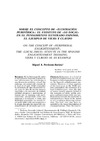Identificador persistente para citar o vincular este elemento:
https://accedacris.ulpgc.es/jspui/handle/10553/58660
| Título: | Sobre el concepto de "Ilustración Periférica": el Estatuto de "Lo Local" en el pensamiento ilustrado español. El ejemplo de Viera y Clavijo | Otros títulos: | On the concept of "Peripheral Enlightenment": The «Local Issue» Statute in the Spanish Enlightenment thinking. | Autores/as: | Perdomo Batista, Miguel A. | Clasificación UNESCO: | 57 Lingüística | Palabras clave: | Ilustración Local Periférica Nación Patria, et al. |
Fecha de publicación: | 2012 | Publicación seriada: | Anuario de Estudios Atlánticos | Resumen: | En la historiografía sobre el movimiento ilustrado español no son infrecuentes las referencias a una Ilustración periférica o local. Sin embargo, un examen del estatuto de lo local en el siglo XVIII contradice la existencia de una Ilustración local, pues la idea de nación aparece vinculada a las nociones de unidad, utilidad, progreso y patriotismo, al tiempo que se impugna todo particularismo, interpretado como una amenaza a lo anterior o como una debilidad censurable. La mirada local pudo haber sido una respuesta a la propia degradación moral del cosmopolitismo, de tal modo que lo local no se plantea necesariamente como una impugnación o una alternativa al pensamiento ilustrado ,sino, justamente, como lo contrario, es decir, como la tardía, desengañada y tal vez nostálgica reivindicación de una Ilustración más esencial y profunda. El análisis parte de algunos textos de Feijoo, Sempere y Guarinos y Capmany para centrarse posteriormente en el ejemplo de Viera y Clavijo a propósito de los aborígenes canario References to a Local or peripheral Enlightenment are not infrequent in historiographical studies on the Spanish enlightenment movement. However, a closer analysis of the local issue in the XVIII century contradicts the existence of a local Enlightenment, since the idea of nation usually appears linked to the concepts of unity, utility, progress and patriotism while any predisposition towards the particular is interpreted as a threat to the nation or as a weakness deserving censorship. The local view may have responded to the moral degradation of cosmopolitanism. Thus, the local issue is not necessarily set out as a contesting notion or an alternative to enlightened thinking, but rather quite the opposite, that is perhaps a nostalgic vindication of a more essential and deeper –reaching Enlightenment. The analysis uses parts of some texts by Feijoo, Sempere y Guarinos and Capmany, to afterwards centre on the example of Viera y Clavijo speaking about the Canary aborigines. |
URI: | https://accedacris.ulpgc.es/handle/10553/58660 | ISSN: | 0570-4065 | Fuente: | Anuario de Estudios Atlánticos [ISSN 0570-4065] (58), p. 215-242 | URL: | http://dialnet.unirioja.es/servlet/articulo?codigo=3986496 |
| Colección: | Artículos |
Visitas
100
actualizado el 05-oct-2024
Descargas
173
actualizado el 05-oct-2024
Google ScholarTM
Verifica
Comparte
Exporta metadatos
Los elementos en ULPGC accedaCRIS están protegidos por derechos de autor con todos los derechos reservados, a menos que se indique lo contrario.
